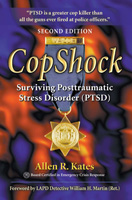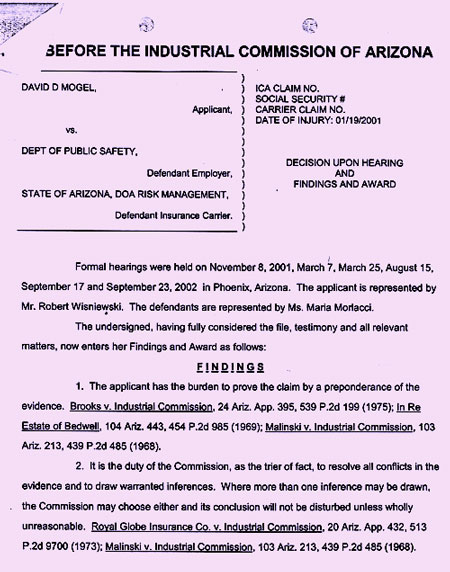
CopShock: Second Edition
Surviving Posttraumatic Stress Disorder (PTSD)
by Allen R. Kates, MFAW, BCECR
Police PTSD Lawsuit
State Trooper Wins PTSD Lawsuit
David D. Mogel
vs.
Department of Public Safety and State of Arizona, DOA Risk Management

An Arizona state trooper has won a precedent-setting court case that affects police officers, firefighters, and other emergency services workers throughout the United States.
On January 20, 2000, Department of Public Safety Officer David D. Mogel killed a shotgun-toting car thief wanted for bank robbery after the suspect attempted to shoot him.
Because of the trauma in taking a human life, Mr. Mogel was diagnosed with Posttraumatic Stress Disorder, and could no longer function as a police officer. When he applied for Workers' Compensation benefits, he was denied. The Arizona Department of Public Safety and Workers' Compensation (State of Arizona, DOA Risk Management) claimed that shooting suspects was part of the job, and not an "unexpected" event as required by Arizona law.
Mr. Mogel's attorney, Robert E. Wisniewski, says, "The state raised the defense that working in police work everyday was not a substantial contributing cause of my client's post traumatic stress disorder because police are exposed to such hazards everyday so that is routine."
In her Findings and Award of December 19, 2002, awarding Mr. Mogel Workers' Compensation benefits, Administrative Law Judge Karen Calderon states, "I find that shooting and killing another human being in the line of duty is an extraordinary stress related to the employment."
The implications of this decision are far-reaching. A police officer's claim of PTSD has not won a court case in Arizona before, and rarely succeeds in other jurisdictions. Mr. Wisniewski says, "This case made a great difference in establishing that post traumatic stress disorder is a cognizable claim for a police officer involved in such a life threatening event."
If Mr. Mogel had lost his case, the decision may have prevented not only police officers, but also firefighters and other emergency workers from collecting Workers' Compensation benefits if injured psychologically on the job.
During the trial, Allen R. Kates, author of CopShock, Surviving Posttraumatic Stress Disorder (PTSD), a trauma survival book, testified as an expert witness. Mr. Mogel's attorney says that Kates's testimony, based on the research presented in CopShock, "was very important in helping the Judge sort out the real issue in this case."
In his testimony, Mr. Kates gave an overview of the effects of PTSD, and presented studies that show police shootings are rare events that no officer, no matter how well trained, can prepare for emotionally or psychologically.
The expert witnesses included police psychologist Dr. Sarah Hallett, therapist Ellen Roy Day, and Mr. Kates. In awarding in favor of Mr. Mogel, the Judge states that, "Conflicts in the evidence are resolved in favor of the opinions of Dr. Hallett, Ms. Day and Mr. Kates as being more probably correct and well founded."
This case, called, "David D. Mogel vs. Department of Public Safety and State of Arizona, DOA Risk Management," will likely be cited in future court proceedings as a precedent in support of police officers, firefighters, and EMS personnel who sustain PTSD injuries incurred in the line of duty.
The product of six years of research, CopShock is used in police academies and police department counseling units around the country. It is considered the top guide on how to prevent or manage police stress and PTSD, and the A&E Television Network produced a documentary based on the book.
Author Allen R. Kates, BCECR, is a journalist and trauma expert, Board Certified in Emergency Crisis Response (BCECR) by the American Academy of Experts in Traumatic Stress. He is trained in critical incident stress debriefings (CISD) and suicide interventions by the International Critical Incident Stress Foundation and by the Arizona Pima County Attorney's Victim Witness Program.
Attorney for David Mogel:
Robert E. Wisniewski, Attorney for police officer David Mogel. (602) 234-3700. Email: bob.wisniewski@azbar.org.
Documents Available on request:
Judge's decision and findings
Newspaper reports
Allen Kates's Availability:
Kates no longer appears as an expert witness in court cases. However, he continues to conduct police seminars and speaks at police functions. Please click here for Police and Military Seminars.
If you are applying for benefits based on a PTSD diagnosis, please read:
Fighting the System